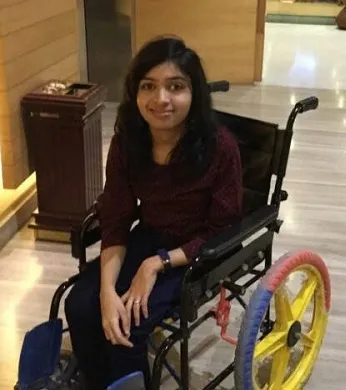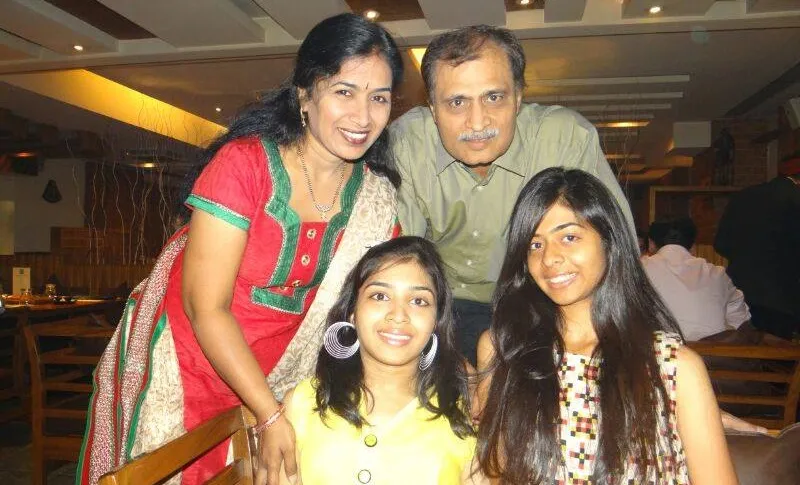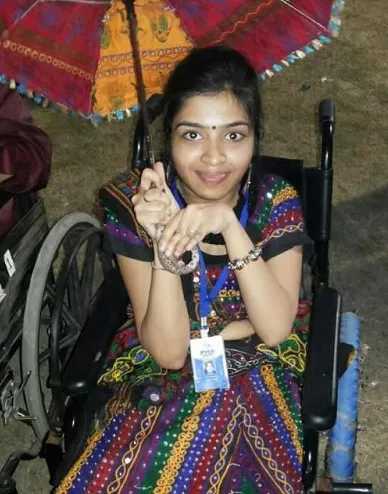“My disability is not my identity!” says Rajvi Gosalia and she is out to prove it
After an hour-long conversation with Rajvi Gosalia, the impression I am left with is of a confident, warm, intelligent, and level-headed young lady. The fact that she suffers from cerebral palsy and cannot walk seems just an incidental detail about her. Unfortunately for Rajvi, and many others like her who lack what the rest of us take for granted, society sees their affliction as their primary identity. Rajvi says, “When I was around 10, I started thinking about who I am. I am mostly known as the daughter of Hemakshi and Ajesh Gosalia. But what is my identity beyond that?” Today, at 28, Rajvi wants to pursue her post-graduate course abroad. It might sound like an impossible dream for somebody who is wheelchair-bound. But Rajvi has been overcoming the impossible since the day she was born.
Rajvi is a team lead at work, volunteers with NGOs that work towards improving the lives of the differently-abled, pursues her passion for singing, and has been the MC at various events in her city, Ahmedabad. Always impeccably dressed, she loves hanging out with her younger sister and friends like most young women of her age. “People do stare at me. It is easy to feel depressed and stay at home. I do not need to work for the money since I know my parents will support me. But I want to live my life to the fullest. I might not be able to stand on my own feet, but that does not mean I cannot do it figuratively,” says the feisty lady.

Cerebral palsy is a permanent movement disorder that can be either congenital or as in Rajvi’s case due to complications at birth, since she was a premature baby. The disorder is caused by abnormal development or damage to the parts of the brain that control movement, balance, and posture. Babies with cerebral palsy do not roll over, sit, crawl, or walk as early as other children their age. The incidence of cerebral palsy in India is three cases per 1,000 live births, making it one of the most common disorders.
Better infrastructure, better thinking

Rajvi believes that the immediate family of special children should receive mandatory counselling. Often parents are in denial of the child’s limitations and keep trying out all kinds of treatments from doctors or even unscrupulous quacks. “The field of medicine is yet to find a cure for many disabilities and we need to accept that. Parents spend huge amounts of money while forcing the child into painful treatments and surgeries, hoping for a normalcy that is not possible. Parents then get upset and this negativity permeates the child’s mind and he starts feeling guilty for letting them down,” says Rajvi. Eventually, many families give up and then expect the child to stay home with their parents or siblings all their lives. Instead, the focus should be on accepting the child’s limitations and making him as independent as possible.Why the mental block towards wheelchairs? Do normal people walk everywhere? Do they not commute by cars and buses? My wheelchair is my own set of wheels!
“Disabled people have hopes and dreams too. We want to pursue our education and a successful career, follow our passions, get married, set up our own house; but society does not understand this.” Independence is what Rajvi craves the most today. Rajvi wants to move out of India because of two reasons – firstly, due to the pervasive lack of disabled-friendly infrastructure, and secondly what she describes as the “Indian Mentality”. Rajvi is aware that a dependent sibling would affect the marriage prospects of her sister. As the protective older sibling and loving daughter, Rajvi does not wish to be a burden on her family.

Hurdles in every step
Rajvi feels the differently abled can be extremely productive and should be assimilated into the society. In India, there are special schools and institutes for the disabled and they are kept away from the mainstream. Rajvi’s parents had to face outright refusal from many schools, when it was time for her school admission. Her alma mater is a regular school, where she was lucky to have found a very supportive management and staff, who even shifted her classroom to the ground floor till she passed out. During those days she did not have a wheelchair, so her mother would carry her to school and back every day. She would participate in all the co-curricular activities, debates, essay writing, and singing competitions. The only occasion she would feel sad was when her classmates would play games on the playground and she couldn’t join them. “But I accepted that reality. What cannot be changed cannot be changed,” she says philosophically.

While pursuing her graduate course and while applying for jobs, she had to constantly face the insensitivity towards the differently abled that is so ingrained in our culture. Practical issues like a lack of ramps and other wheelchair-friendly infrastructure is a daily hassle for her. But she had decided she would persevere, and she did exactly that. In 2012, she was selected as a tele-marketer at Vodafone’s franchise called Vikalp Centre, where she has been promoted to the position of team coach and manages a team of 36. “This might not seem like a big achievement for many. But for me it is huge!” she says with a smile.Rajvi is presently involved with two NGO’s – Udaan and Pha International. Her attempts are to help organise outings and activities for disabled children, so they can experience life like normal children.
Her achievements are being recognised. She was featured on the ‘Humans of Amdavad’ online community, interviewed on a radio FM channel, and was presented a Nari Ratn Award during VTV women’s week celebrations.
Dream so big that nobody would dare cut them short
Rajvi hopes that her story inspires the disabled to dream big. “You do not need legs to fly. You only need faith in yourself and courage. Be ambitious and have high self-esteem and do not allow anybody to cut short your dreams,” she signs off.







